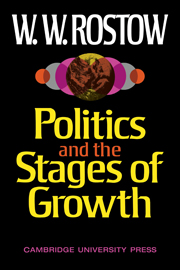Book contents
- Frontmatter
- Contents
- Tables
- PREFACE
- INTRODUCTION
- 1 A way of looking at politics
- 2 Politics in pre-Newtonian societies
- 3 The politics of the preconditions for take-off
- 4 The politics of the take-off and the drive to technological maturity
- 5 American politics: a not so special case
- 6 The politics of the search for quality
- 7 Politics and democracy in the contemporary developing world
- 8 War and peace in the global community
- APPENDIX: The views of others in relation to the approach taken here
- NOTES
- INDEX
APPENDIX: The views of others in relation to the approach taken here
Published online by Cambridge University Press: 16 October 2009
- Frontmatter
- Contents
- Tables
- PREFACE
- INTRODUCTION
- 1 A way of looking at politics
- 2 Politics in pre-Newtonian societies
- 3 The politics of the preconditions for take-off
- 4 The politics of the take-off and the drive to technological maturity
- 5 American politics: a not so special case
- 6 The politics of the search for quality
- 7 Politics and democracy in the contemporary developing world
- 8 War and peace in the global community
- APPENDIX: The views of others in relation to the approach taken here
- NOTES
- INDEX
Summary
Reasons for this appendix
A book stands on its own feet. It is judged useful by others to the extent that it illuminates problems that interest them. Those engaged in the study of politics are thoroughly capable of assessing this book in relation to their concerns.
This Appendix presents the view I have formed of the present state of the study of political development; and the relation of this book to that rich and lively literature. The treatment here of that literature will be illustrative rather than encyclopedic. This Appendix is an essay in ideas rather than bibliography.
The rationale for this Appendix is the following. First, I have been for many years a friendly and respectful observer of modern political science, especially of that part of it focused on political development. In the 1950s at M.I.T., for eight years in government, and in writing this book and teaching its substance, I have read and profited from the efforts of those who have sought to use new methods in studying the oldest of man's problems: how to rule himself. It is possible that the perspective on those efforts of an historian and economist, who has also had the occasion to study and participate in political life, may prove marginally helpful to those fully engaged in the field.
Second, it is my impression that the field is now fragmented but capable of greater unity than it has thus far attained. I believe I understand the reasons for that fragmentation.
- Type
- Chapter
- Information
- Politics and the Stages of Growth , pp. 334 - 360Publisher: Cambridge University PressPrint publication year: 1971



